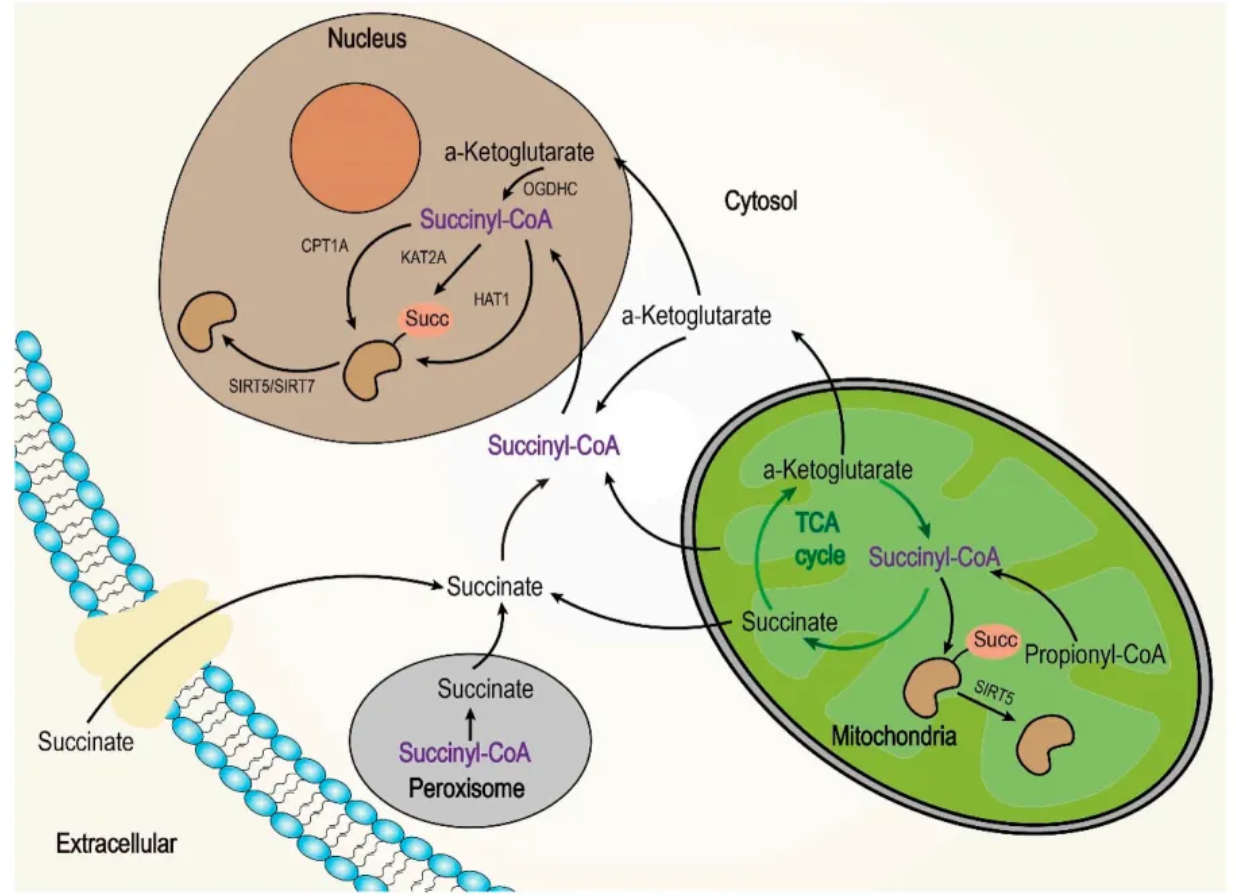Succinylation Proteomics Analysis Services
- Fresh animal tissue: ≥600 mg
- Fresh plant tissue: ≥6 g
- Cultured cells: ≥1×10⁷ cells
- Fungi / bacteria: ≥600 mg
- Serum / plasma: 450 μL
- Protein solution: Total protein 5–10 mg
- Body fluids: (e.g., saliva, amniotic fluid, supernatant) ≥15 mL
- All samples should be snap-frozen in liquid nitrogen and stored at –80°C. Ship samples on dry ice to ensure integrity during transit.
Lysine succinylation is a dynamic post-translational modification (PTM) involving the covalent addition of a succinyl group—typically derived from succinyl-CoA—to lysine residues. This modification occurs through both enzymatic and non-enzymatic mechanisms and is widely conserved across diverse biological systems such as bacteria and mammalian cells. Succinylated proteins have been detected in multiple cellular compartments, including membranes, cytosol, organelles, and the nucleus. Functionally, protein succinylation plays critical regulatory roles in key metabolic pathways such as glycolysis, the TCA cycle, and lipid metabolism. Its broad involvement in fundamental biological processes makes succinylation profiling an essential approach for understanding cellular function, disease mechanisms, and metabolic regulation.

Liu, Z. et al. Biomed Pharmacother. 2023.
Figure 1. The Process and Functions of Lysine Succinylation
Service at MtoZ Biolabs
MtoZ Biolabs offers comprehensive Succinylation Proteomics Analysis Services. Leveraging high-resolution LC-MS/MS platforms, specific antibody enrichment, and advanced bioinformatics, we deliver high-confidence identification and site-level characterization of succinylated proteins across a wide range of species and sample types. Clients simply need to submit qualified samples, and our expert team will handle the entire downstream workflow, including protein extraction, enrichment, mass spectrometry acquisition, data analysis, and customized reporting.
Analysis Workflow
1. Sample Preparation
Cell, tissue, or biofluid samples are lysed under conditions preserving PTMs. Proteins are quantified and digested using sequence-grade trypsin.
2. Succinylated Peptide Enrichment
Enrichment is performed using high-specificity anti-succinyl-lysine antibodies to selectively isolate modified peptides.
3. LC-MS/MS Analysis
Enriched peptides are analyzed on high-resolution LC-MS/MS systems, ensuring confident peptide identification and modification site localization.
4. Data Processing and Bioinformatics
MS data is processed using robust algorithms to identify succinylated peptides. Quantitative and pathway enrichment analyses are included upon request.
5. Custom Reporting
A comprehensive report is generated, including raw and processed data, MS spectra, site information, and optional statistical insights.

Figure 2. The Workflow of Succinylation Proteomics Analysis Services
Service Advantages
☑️High Sensitivity and Specificity: Antibody-based enrichment ensures detection of low-abundance succinylation events.
☑️Ultra-High Resolution MS: Our advanced MS platforms deliver precise mass accuracy for confident site identification.
☑️Flexible Quantitative Strategies: Label-free quantification and label-based multiplexing are available for comparative analysis.
☑️Customizable Workflow: Tailored solutions based on your biological system, treatment design, and sample type.
☑️Expert Bioinformatics Support: Functional annotation, GO/KEGG enrichment, PTM motif analysis, and protein interaction network mapping.
☑️One-Stop Service: From experimental design to data interpretation, we provide seamless project support.
Applications
1. Medical Research: Explore succinylation’s role in cancer, neurodegeneration, cardiovascular diseases, and metabolic disorders.
2. Drug Discovery: Identify succinylation-based drug targets and assess therapeutic effects on PTM landscapes.
3. Plant Biology: Study how succinylation regulates stress responses, growth, and metabolism in crops and model plants.
4. Microbial and Environmental Studies: Investigate succinylation in beneficial microbes used for soil health, bioremediation, and fermentation.
Sample Submission Suggestions
1. Sample types
We accept a variety of biological samples for succinylation proteomics analysis.
2. Storage and Transport
*Note: If you have specific requirements or need guidance on sample preparation, please do not hesitate to contact us.
Deliverables
1. Comprehensive Experimental Details
2. Materials, Instruments, and Methods
3. Total Ion Chromatogram & Quality Control Assessment
4. Data Analysis, Preprocessing, and Estimation
5. Bioinformatics Analysis
6. Raw Data Files
Related Services
Quantitative Succinylation Service
Histone Succinylation Analysis
How to order?







